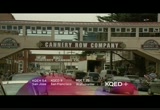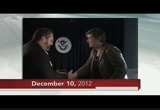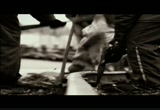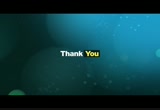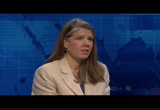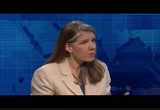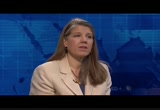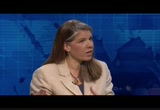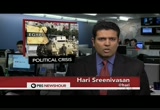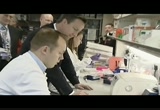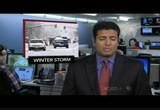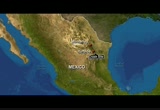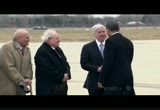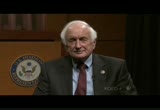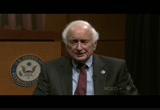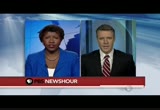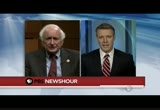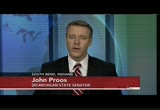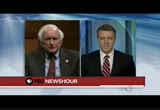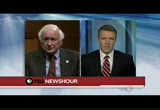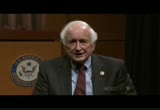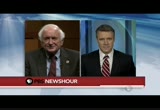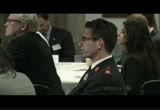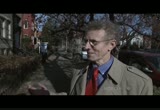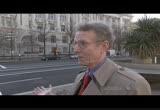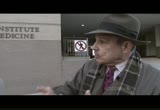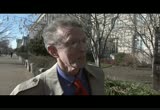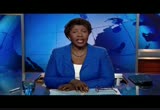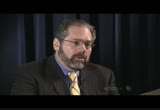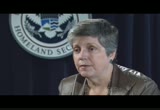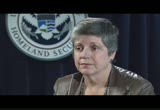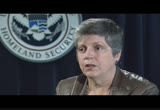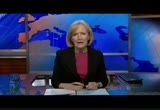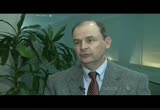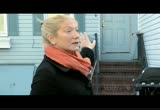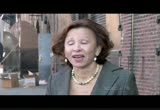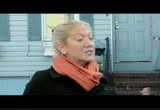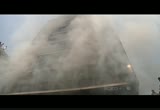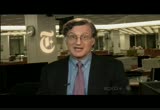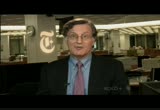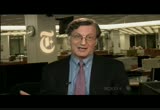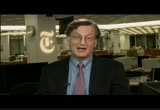tv PBS News Hour PBS December 11, 2012 12:00am-1:00am PST
12:00 am
captioning sponsored by macneil/lehrer productions >> ifill: high-level meetings are happening, but the players aren't talking. good evening. i'm gwen ifill. >> woodruff: and i'm judy woodruff. on the newshour tonight, we'll update negotiations aimed at avoiding the fiscal cliff. >> ifill: then, we look at michigan's debate over right-to- work laws which would prevent labor unions from requiring membership. >> woodruff: paul solman explores the tax deductions that could be on the chopping block in the quest to bring down the deficit. >> we estimate $1.1 trillion a year in revenue the government gives up because of all the tax breaks. that's enough to solve the
12:01 am
revenue problem but it's not going to happen. >> ifill: ray suarez has a newsmaker interview with secretary of homeland security janet napolitano. >> you can discuss border security and immigration reform simultaneously now. we don't have to this kind of first this and then that. at this point they actually go together. >> woodruff: special correspondent rick karr reports on the polluted waters that spilled into new york homes and businesses in superstorm sandy, raising health concerns. >> everybody sort of got sick at the same time. all of us sort of attributed it to, well, we're all stressed out. it's very cold. but that said, there is a lot of nasty stuff hanging about. >> ifill: and hari sreenivasan has an update on the dangerous working conditions in bangladesh, where more than 100 workers have died over the past month. that's all ahead on tonight's newshour. major funding for the pbs newshour has been provided by:
12:02 am
moving our economy for 160 years. bnsf, the engine that connects us. and by the alfred p. sloan foundation. supporting science, technology, and improved economic performance and financial literacy in the 21st century. and with the ongoing support of these institutions and foundations. and... this program was made possible by the corporation for public broadcasting. and by contributions to your pbs station from viewers like you. thank you.
12:03 am
>> woodruff: president obama made another foray outside washington today, trying to build public support for a fiscal cliff agreement. it came a day after he resumed talking with the top house republican, and as a year-end deadline moved even closer. the president took his public campaign for a deficit deal on his terms to the daimler diesel plant in redford michigan. >> if congress doesn't act soon meaning in the next few weeks, starting on january 1, everybody is going to see their income taxes go up. it's true. y'all don't like that? >> no! woodruff: instead, mr. obama again pressed for raising tax rates on the top two percent of incomes. >> and that's a principle i won't compromise on because i'm not going to have a situation where the wealthiest among us,
12:04 am
including folks like me, get to keep all our tax breaks and then we're asking students to pay higher student loans. >> woodruff: his michigan visit came a day after the president and house speaker john boehner met privately at the white house. their first one-on-one session since the election. neither side gave any details about what was discussed. instead they issued identical statements saying that lines of communication remain open. at the same time the sunday talk shows highlighted a partial split in g.o.p. ranks over letting the president have higher tax rates on top earners. tennessee senator bob corker told fox news sunday that republicans should give ground on taxes and concentrate on long-term spending cuts. >> the focus then shifts to entitlements. maybe that puts us in a place where we actually can do something that really saves this nation.
12:05 am
so there is a growing body -- i actually am beginning to believe that is the best route for us to take. >> woodruff: but on nbc, house majority whip kevin mccarthy countered that that approach is the wrong way to go. >> it doesn't solve the problem. the president is asking for higher rates, he's asking for more revenue. most economists agree the best way to get that is through closing special loopholes. when you close those it makes a fair tax process. >> woodruff: a new poll from politico and george washington university backed the president's position. 60% favored raising taxes on households earning more than $250,000 a year. 38% were opposed. another survey last week found that by a 2-to-1 margin, americans would blame republicans if there's no agreement by the end of the year. for more on the political dynamics at play and what might be in the deal taking shape, we are joined by lori montgomery, a reporter for the "washington
12:06 am
post." she covers economic policy and the federal budget. welcome back to the program. >> thanks for having me. woodruff: let me come at this from a different direction. is there anything the two sides agree on? >> well, they both finally agree that we need to raise some tax revenue. but they don't agree on how we should do that. that is the fundamental sticking point. the president wants to raise rates on rich people. john boehner and house republicans have drawn a bright line in the sand that they will not raise rates. they'll give him revenue but not by higher rates. >> woodruff: and we learned that a week ago. that was when the republicans came out and they met at the white house yesterday, the president and the speaker. what came out of that meeting? >> neither side is really telling us what happened but by all accounts on both sides the meeting was very cordial. but there were no breakthroughs. there was no give from speaker boehner on the rate question, which according to democrats in the white house is the first hurdle you have to clear. there are unwilling to discuss how we're going to tackle the entitlement problem until
12:07 am
republicans very specifically agree that rates are going to go up. >> woodruff: each side still saying, lori, that the other side has to give. >> that's right. woodruff: and so right now what is the pressure on the speaker? i mean he has to worry about being re-elected speaker in january. what is he hearing from his ranks? >> well, people are all over the map. it's sort of hard to tell what he could marshal the votes for. i think that's one of the problems they're facing. when you hear people like corker, you know, there's echos of what his... his point on the house side as well that people are saying go ahead and give him the rates and let's toss this into next year when we have a debt ceiling coming up and we'll have pressure to get the spending cuts we want. other people say no way i won't vote for rates under in any circumstances. it's all over the map and lawmakers don't have a lot of information about the state of these negotiations. >> woodruff: at this point are the staffs even talking to each other? >> the staffs we are told are
12:08 am
continuing to talk. but they don't have much time. if they want to do a big bipartisan deal that has all these moving parts in it, they need to start selling it to lawmakers by the end of this week. >> woodruff: what are they saying in these meetings? they're talking about neither side... i mean, there must be... is there any scenario presenting or... what do you hear? >> that's an excellent yes. i wish i could answer it for you. but what we are told is that, you know, i mean, they've got a numbers problem to solve too. boehner offered $800 billion over ten years. the white house wants $1.6 trillion. they have to meet on the numbers somewhere. at this point boehner's office is saying they have refused even to agree to a higher number. >> woodruff: finally, one is hearing some talk that one or the other side may feel it's better to wait until after january 1. >> well i think people are both sides are start of gaming out what happens if we to january. democrats feel that, you know, at that point everything becomes
12:09 am
a tax cut because taxes are already up. so we'll be cutting taxes. and republicans maybe feel that, you know, you could see where that might be a good thing for them too. there are big pressures bushing against... pushing against that too. this is a congress that has been fighting over these issues for two years. corker has made this point as well. if we can't do it, we've been over all these issues. now is the time. there's going to be a new congress in january. you have to educate all these new people coming in. in addition to the economy, there are incentives to get it done now. >> woodruff: we'll let you go back to watching it. lori montgomery of the "washington post," thank you. >> thank you. >> ifill: still to come on the newshour, the right-to-work battle in michigan; tax breaks on the chopping block; homeland security secretary janet napolitano; toxic chemicals in sandy's storm surge; and factory workers at risk around the world. but first, with the other news of the day, here's hari sreenivasan.
12:10 am
>> sreenivasan: egyptian president mohammed morsi called out the military today, ahead of next weekend's referendum on a new constitution. opposition forces say the document will enshrine the power of islamists and curb human rights. security forces were deployed today near the presidential palace where protesters remain camped out. they said it's not enough that morsi rescinded decrees that granted him near-absolute power. e new constitutional declaration canceled the first one but statement it contained the same statement as the previous one. he is playing with us and trying to gain time until the referendum. we understand that. nothing changes our position because we know he hasn't changed anything. >> sreenivasan: the anti-morsi faction has organized a new round of mass protests tomorrow. meanwhile, morsi's islamist supporters are planning a rival demonstration of their own. the president of venezuela, hugo chavez, flew to cuba today for his third cancer operation in the last year and a half. chavez was greeted by president raul castro upon his arrival in
12:11 am
havana. chavez is scheduled to be sworn in to a new six-year term, one month from now. meanwhile, former south african president nelson mandela underwent new medical testing in johannesburg. he was hospitalized saturday for an undisclosed ailment. mandela is 94 years old. britain will become the first country to try to map the genetic code of thousands of cancer patients. the government said today it is setting aside $160 million for the project, over three to five years. we have a report from lawrence mcginty of independent television news. >> reporter: after treatment this woman told me she's now fine. genetic tests show she has a gene called backer which means the cancer would almost certainly come back. she decided to have her ovaries and breasts removed to stop it returning. genetic testing had saved her life. the prime minister was today banging the drum for even more genetic testing that will analyze all the genes of 100,000
12:12 am
cancer patients like francis to build up a d.n.a. database. scientists first decoded the three billion bits of d.n.a. in the human genome 12 years ago making it possible to tailor drugs for individual patients. >> we have to say to the lady in front of us in the clinic we know from the bar code in your cancer that you will respond to this treatment but not to this treatment. thavery important. we have treatments that work for some of our patients but we need to have tests that really can choose the right treatment for the right person at the right time. >> reporter: but it's not just tailoring drugs for individual patients. researchers will be able to use the d.n.a. database to look for new cancer genes. finding them should allow sign tiffs to develop new treatment. >> sreenivasan: the project has raised privacy concerns, but prime minister cameron's office said participation is voluntary, and the data will be made
12:13 am
anonymous before it is stored. parts of the upper midwest in the united states are digging out after a slow-moving winter storm dropped up to 14 inches of snow over the weekend. in minnesota and wisconsin, roads were a mess on sunday as drivers braved ice, snow drifts and low visibility. by this morning, the minnesota state patrol reported more than 600 crashes, with at least one fatality. trading was light on wall street today. the dow jones industrial average gained 14 points to close near 13,170. the nasdaq rose almost nine points to close just short of 2987. the former head of the international monetary fund, dominique strauss-kahn, has settled a sexual abuse lawsuit, for an undisclosed amount. a state court judge in new york announced the agreement today between strauss-kahn and a hotel maid. she had accused him of assaulting her last year. strauss-kahn said it was consensual, but the incident sparked other allegations and ended his hopes of running for president of france. authorities in mexico and the u.s. confirmed today that singer jenni rivera was killed sunday in a plane crash. she and six others were on a private jet that went down south of monterrey in northern mexico. the cause of the crash is under investigation.
12:14 am
rivera was one of the most popular female singers in the musical genre known as grupero. she sold more than 15 million albums and won a number of latin music awards. jenni rivera was 43 years old. those are some of the day's major stories. now, back to gwen. >> ifill: michigan, home to the united auto workers and one of the most heavily unionized states in the country, is suddenly ground zero in the national debate over workers' rights, as the republican lawmakers who control the state's legislature prepare to cast a vote tomorrow that could permanently alter the political landscape. >> ifill: hundreds of people descended on the state capitol building in lansing last week to protest a move to make michigan a right-to-work state. republicans running the state house and senate have approved a pair of bills to allow workers to hold union jobs without joining the union. organized labor was furious.
12:15 am
>> you will have people that will be working right ale long side of you that will not have to pay union dues but you pay union dues but will still be able to get all the benefits from being a union member. >> ifill: democrats in the legislature complained that republicans rammed through the bill with no hearings or public comments. >> this is a travesty. they're pushing this at the 11th hour because they know that the public doesn't want it. >> ifill: republicans argue a right-to-work law will make michigan more attractive to potential employers. >> it's about creating an environment where job providers and employers will want to come to michigan, create jobs here, better jobs, more jobs. >> we have hung out the open for business sign to the world. michigan has the best trained work force. now has options and opportunities for more people. >> ifill: republican governor rick snyder agrees the law will help the state. he has promised to sign it.
12:16 am
snyder greeted president obama when he traveled to michigan today but there was no indication that they discussed the right-to-work issue. the president was later cheered when he visited an engine assembly plant outside detroit. >> these so-called right-to-work laws they don't have to do with economics. they have everything to do with politics. what they're really talking about is giving you the right to work for less money. >> ifill: 23 states have laws on the books banning the mandatory collection of union dues. in wisconsin republican governor scott walker turned aside a recall vote after he curtailed collective bargaining for public employees. voters later repealed an ohio law to reduce collective bargaining. michigan lawmakers are scheduled to vote on the right-to-work law tomorrow. union supporters planning for large-scale protests, cement the weekend in civil disobedience training. now, for more on the behind-the-
12:17 am
scenes debate over right to work, we're joined by michigan congressman sander levin, a democrat. he met today with governor snyder and with the president. and republican state senator john prose, who is one of the sponsors of right-to-work legislation. representative levin, i want to start with you because you met with two of the key people who who have been debating this today, governor snyder, president obama. what were you there to say? >> to say this is a very divisive effort. michigan is already open for business. we added 30,000 auto jobs since the recession began. already we're growing. this would terribly disrupt the pattern of labor-management relations that has really evolved very effectively for the last decade-and-a-half. it's deeply divisive. secondly i want the record to be very clear. there is no requirement today that people pay union dues or belong to a union. what the law says is this. if a majority of employees vote to be represented, if they
12:18 am
decide to do that and if the employer decides to agree that there can be a requirement that people pay their fair share for representation. that can be done. it should be emphasized under the federal law and the state law where a majority decides to be represented, the representative must, must represent everybody regardless of whether or not they're a union member. there can be no distinction. i talked to someone today at detroit diesel. he said this. he went down to the plant in north carolina. there was on a t-shirt, it said, "i ride. you pay." essentially people want to be free-riders and not be responsible and pay a fair share of the cost of representation. after a democratic election. that's what this is all about. >> ifill: let me talk to state senator prose about that.
12:19 am
how do you respond to this idea that there's no need for a law like this? >> i think when you look at the issue of right to work or freedom to work you really have to ask the question whether or not that individual is buying into a system that they care to be a part of, that they really choose to be a part of. do they have the ability to do so or are they coerced into doing so in the process? frankly when you look at the issues surrounding this particular question, you cannot operate in a vacuum. you have to recognize the fact that states like indiana, that border our state of michigan, is the 23rd state. michigan would be the 24th state. this isn't a new discussion nationwide. 24 states in the next couple of days will be the right-to-work states that will put us in a better position for worker freedom where they have the chance to actually choose to participate without it being compelled to do so. >> let me just say... ifill: go ahead, congressman. let me say in terms of brand new. look, there has been no airing of this issue in michigan. >> i disagree completely
12:20 am
congressman. >> let me finish. ifill: gentlemen, one at a time. i'll give you your opportunity to respond. >> let me finish. what happened was this. there was an election. this is a lame-duck session. it was decided, well, because of the election, maybe you can't get it through next year so push it through. there are no hearings ever been held on this in the state of michigan. we've had a pattern ofy fek live labor-management relations for many many years. now you're going to set people against each other. there's no coercion here. nobody has to join a union or pay dues. they have to pay a fair share of representation that must include... >> thanks, gwen, i would like to respond. >> ifill: i want to respond and i also want you to answer this question for me. why now? why are. >> we had significant debate in the senate and in the house of representatives. over 20 amendments that were debated and discussed. all of them were defeated in the process but the reality is that
12:21 am
workers today are in a competitive environment. there's no question about that. we exist in a competitive environment both nationally and internationally. it's up to each of the states to put themselves in the very best position to grow jobs and to grow the economy and to allow our michigan businesses to compete to keep, grow and bring in new jobs. this border between indiana and michigan with indiana now being right to work is a great concern to me. i think it's at great concern to those of us in the legislature who say let's give those workers the freedom to choose if they want to participate. no difference than if they choose to go to a particular restaurant or choose a particular plumber or choose to have somebody that is giving them good value and good benefits for the pay that they give that individual or in this case that private organization. >> ifill: i would like either of you to cite for me a specific example, in your case congressman levin, in your case state senator prose where the right to work either depress the
12:22 am
economy or help the economy in any other state and would specifically in michigan. starting with you, congressman. >> they clearly depress wages. look, we can compete in michigan. we don't have to compete with the lowest common detom naturor. we're doing much better. we're doing much better because people have a voice in the workplace. what the state senator is doing in essence is to snuff out the voice in the workplace to destroy collective bargaining that made the middle class of michigan and this country. that's what this is really all about. >> ifill: state senator prose, you mentioned indiana repeatedly. give me a specific example of how indiana's economy has been improved. >> you bet. i think there are two very specific examples that we can point to. first off on more of a global perspective we have 12.5% increase according to the bureau of labor statistics, a reputable organization that we all point to, to determine our specific statistics t12.5% increase both
12:23 am
in wages as well as in jobs. we've only seen a 3.1% increase in those states that are not right to work. the right to work states have seen good benefits. let me point very specifically to a company in fort wayne indiana bringing 66 high-tech jobs to fort wayne. android industries could go any place in the world. they chose fort wayne specifically they noted because it in fact is a right to work state. that's the kind of competition that we need. worker freedom gives that opportunity for that in the state of michigan. >> let me finish. it's not a matter of worker freedom. look, the majority selected a representative who must represent everybody without discrimination. and the issue is whether there will be free riders. whether people who benefit from the representation have to pay a fair share. that's a good american idea. it's what has made the middle class of this country. we should not compete with the lowest common denominator. that's what this state senator
12:24 am
and others are proposing. the governor said it wasn't on his agenda. all of a sudden they're cramming it through. it will be very destruct stiff, divisive for the state of michigan and beyond. >> ifill: but congressman the governor has said and probably said this to you today, i'm curious whether he did that union membership is declining in michigan so this wouldn't really affect that many people. >> that's such a fallacious argument. this is the reason. representation has lifted wages, benefits, and made sure people had health care. and security. you know, everybody has benefited; many who aren't union members. because we have lifted -- lifted the scale instead of it going downward. we need not to really appeal mainly to lowering and lowering the level of wages and benefits in this country. we need to uplift and
12:25 am
essentially this would put michigan and others in a downward spiral, a frightfully bad mistake. >> ifill: state senator prose, you have the final word. >> i appreciate that. thank you, gwen. i appreciate discussing this topic. i think it's so very important to the citizens of michigan. it is really important when you look at the statistics. i appreciate congressman sander levin's concern. when you look at the bureau of labor statistics and a 12.5% increase in jobs and economic benefit. when you look at companies like android industries in indiana that are bringing new jobs to indiana simply because of right of work it's important that we give workers that freedom to choose what they think is best for them and their representation-instead of paying that private industry, that private union that is instead providing what is in some cases a sub par service. you ought to be buying a service that you believe in and you believe is going to represent you well. 17% of michigan are union folks today. 17% will be union tomorrow, gwen. >> ifill: state senator john prose, republican and
12:26 am
representative sander levin, a democrat. thank you both very much. >> thanks very much. >> woodruff: now, back to the battle over the fiscal cliff. much of the debate has centered on the question of whether to raise tax rates on high income earners. but many experts are also raising questions as to whether major tax deductions should be limited or even eliminated entirely. the newshour's economics correspondent paul solman was in washington recently to examine the possible impact of such a change. it's part of his ongoing reporting, "making sense of financial news." reporter: at saint martin's catholic church last thursday, they queued up early for clothing and food. the church, like any nonprofit, relies on charitable donations. but limiting or even charitable deductions could be part of a deal to avoid the fiscal cliff.
12:27 am
one man of the tax policy center says given our national debt? sort of tax hikes are inevitable. >> one way is to tax the same income we have right now but get more revenue. the alternative is to tax more. get rid of the deductions and the exemptions, the things that reduce or taxable income. we tax more at today's rates and we bring in more revenue. >> reporter: itemized deductions are the first form of tax breaks on the table. used by 30% of tax payers they cost the government over $200 billion a year. about a fifth of this year's deficit. charitable donations alone cost $40 billion a year. but ending them is costly too. >> anybody who gives money away, taxes will go up. they'll pay more. that's what we're all about trying to get rid of these. but at the same time they'll likely give less to charity. if i don't get the deduction, it's going to cost me more after taxes to give away money.
12:28 am
>> reporter: and say nonprofit leaders, if the rich stop giving, the poor stop getting. >> we're here to urge congress to protect a 100-year-old tradition. >> reporter: a tradition that hundreds on capitol hill last week were working to uphold. who doesn't want places like saint martin's to survive? >> the organizations that we classify as charitable -- churches, hospitals, universities -- those are all things we think are good. the government is encouraging contributions by giving the deduction. take it away your contribution and places like this will be worse off. >> reporter: the biggest tax deduction of all is also popular. the $84 billion a year mortgage interest deduction. >> if you're paying interest on your mortgage, you can deduct that, reduce your taxable income and therefore pay less to the i.r.s. >> reporter: does this deduction have a demonstrably fect on people's behavior, what they do when they're buying houses? >> it affects their behavior but in an odd way.
12:29 am
it doesn't induce people to buy a house in the first place. it doesn't change their likelihood of buying. it induces them to pay more for a house or buy a bigger house. we're subsidizing big houses not homeownership. >> reporter: the amount you save depends on your marginal tax rate, the rate applied to money you earn once you reach your highest bracket. >> you save 5 cents for every dollar you duct in the 35%. if you're in the 15% tax bracket you only save had 15 cents. in terms of the home mortgage we're subsidizing rich people a lot more than we're subsidizing lower income people. >> reporter: some people misunderstand this and think when you're at the 35% bracket it means all your income is taxed at 35%. it's only income above a certain threshold, right. >> everybody walks through the bottom tax bracket. everybody pays 10% tax on the first $10 0urbgs-$15,000 income. at the very top you're paying 35% on that last piece of income. that's where the deducks come in. >> reporter: what's the argument
12:30 am
against removing the mortgage interest deduction? >> there will be people who can no longer afford their mortgages. if they don't get the tax savings they don't have enough to cover the mortgage payments. secondly there will be an immediate drop in housing prices. people will not be willing to pay as much for housing. therefore prices will come down. every homeowner will suffer a capital loss. >> reporter: next stop, the wilson building which houses d.c.'s mayor and city council. next major tax break, state and local taxes. deductible in full from taxable income. this costs the federal government about $47 billion a year, almost 5% of the annual deficit. so what's the objection to getting rid of the state and local tax deduction? >> the deductions for state and local taxes lowers the cost the citizens are paying those state and local taxes. it means those governments can charge higher tax than they otherwise would. take that away they'll have to
12:31 am
lower their revenues at a time when they're in trouble themselves or it's going raise the cost to the citizens who won't be happy about it. >> reporter: as lawmakers rush to rescue the economy from the fiscal cliff emergency, they have focused -- as have we thus far -- on itemized deductions. but when it comes to tax breaks or preferences, says robert... >> not just deductions. it includes things like exclusion from income, the biggest one of which is the we don't tax you on the premiums your employer pays for the health insurance we get. much bigger than anything on the deduction side. it's not the only exclusion we have. the exclusion of all the contributions to the retirement plans, your 401(k), your irks r.a., also very, very large. >> reporter: we're not going to start counting as income the money that our employer puts in for our medical insurance, are we? or for that matter, we're not going to get rid of the exclusion for putting money into a 401(k) to deaver taxation
12:32 am
but encourage us to save more. >> it's pretty unlikely we'll count all of that income. we're already scheduled to count some of the premiums paid your employers. in 2018 the obama care will start taxing the very highest premiums, the cadillac plans. anything over that will suffer an excise tax that is like adding. we're not likely to do on the retirement-savings side because people aren't saving enough for retirement anyway. we don't want to do anything that will discourage them from putting more money in the accounts. >> reporter: we could have spent the entire week in washington itemizing tax breaks, of course. child credit. earned income tax credit. special rates for dividends and capital gains. but time is short. so we ended our tax tour here with the last often heard solution. >> one proposal we've been hearing more about is simply capping deductions.
12:33 am
$25,000. $50,000. anything beyond that, you can't deduct. what does that do and how does that work? >> reporter: the problem with capping the deductions rather than getting rid of them entirely is you lose a lot of revenue. capping at $25,000 loses almost half the revenue you'd get by getting rid of this deduction completely. capping it $50,000 loses almost a third. there's just not enough revenue if you do only that. there's a lot more money if you go after all the tax breaks that people have. we estimate roughly $1.1 trillion a year in revenue the government gives up because of all the tax breaks. the lower rates on dividends. the exclusion and the loss of income. the deducks, the tax credit. we bring in an additional trillion dollars a year. that's enough to solve the revenue problem but it's not going to happen. >> reporter: why not? people really like the breaks they're getting. they want to be part of the tax system. it saves them money. take them away. they'll be really angry. they'll be out there defending
12:34 am
them as strongly as possible in these negotiations. >> reporter: and unfortunately in the process making the fiscal cliff harder to avoid. >> ifill: want to know how the fiscal cliff could impact >> ifill: want to know how the fiscal cliff could impact your tax bill? calculate how much you would pay under different policy scenarios on paul's "making sense" page. >> ifill: once congress gets past its budget woes, another huge domestic challenge awaits. republicans and democrats have said they will take up immigration reform. the question is how. last week a new pew hispanic center report showed illegal immigration is on the decline. last year there were 11.1 million illegal immigrants living in the country, down from 11.2 million in 2010. that's down from a peak of 12 million unauthorized immigrants reported in 2007. latino voters overwhelmingly supported president obama in
12:35 am
november, and he has said immigration reform will be high on his second term agenda. homeland security secretary janet napolitano will oversee the administration's next steps. ray suarez sat down with her earlier today. >> suarez: secretary napolitano, welcome to the program. >> thank you. suarez: over the week past there's been a lot of reporting saying once we figure out what to do about the fiscal cliff, immigration is next. are the people who are writing that correct? >> i certainly hope so. i think that having dealt with border enforcement and immigration enforcement for the last 20 years, i can say it is time to look at the entire system and make sure that it matches our economic needs, our law enforcement needs and our values. right now there are some mismatches that are fairly serious. >> suarez: any plan has to be assessed for its flaws ibility. is this going to work?
12:36 am
does d.h.s. take a role in helping the political side of the shop figure out what would work and what wouldn't work in an answer for having so many people in the country out of that? >> yes. it happened in a number of ways. first we work with the white house. we're the operational side. we're the ones that manage the thousands of agents and investigators and adjudicators who are operating the immigration system, the border patrol, operating the border security mission. but as congress begins to take this subject up -- and we hope they will -- we would be there to provide them real assistance and understanding what affects different provisions could have. >> suarez: many of the members of the house and senate say, oh, sure, we'd like to do it. but border security first. what's the department of homeland security's answer? >> my answer is look at the numbers and look at what we've
12:37 am
done on border security. we have more manpower, technology. we actually have air cover now across the entire southwest border. things that we never had before. and like i said, i started off in immigration and border enforcement. you know, 20 years with the u.s. attorney for arizona. i've seen the changes. i know what impact they have h had. so that illegal immigration numbers are down to where they were 40 years ago. you know, you're never going to feel that border. that's not a possibility. but you can discuss border security and immigration reform simultaneously now. we don't have to this kind of first this and then that. at this point they actually go together. >> suarez: it's the policy of the obama administration and of course your department to use prosecutorial discretion when you're working with people who are undocumented, who are in the country illegally.
12:38 am
there have been reports saying that even though that's the policy, up to half of the people that the united states has sent home in the last three years haven't been violent criminals. many thousands have only committed the crime of being here out of status. >> that's not accurate. it's certainly not accurate in the last year or two as we've seen priorities get situated within the department and enforced. so that last year upwards of 90% of those we remove from the country either had criminal violations, they were repeat violators, those who use our border as kind of a revolving door or those we caught right at the border. we don't want them to get into the interior of the country. i think as we move forward, those numbers will become more and more robust in the sense of filling out who are the actual criminals who are being removed from the country, criminal in
12:39 am
the sense they've committed violations other than or in addition to being in the country illegally? >> suarez: right now we're coming out of a jobs trough at a time when there's been slack demand for labor in the united states. is this something that has to get fixed before the job engine revs up again, before there's a hunger and a new demand for labor? does the united states have to have a better answer they've we've had in the past? >> well, i think one of the things we need to watch for is as our economy recovers, will it become kind of a draw for illegal immigrants from mexico, central america and the like? now, the mexican economy is also coming back. that actually has been very helpful. mexico now is talking about having its own border patrol on their northern border. that would be very helpful. i think we want to work together with mexico and their new leadership on what we do with respect to illegal migration
12:40 am
from central america. but all of these things, as your question says, they all are related with each other s you have to create the right balance. you have to have the right way for people to come in legally. you have to have the right balance for who can come in to work particularly in certain jobs where there's a continued labor shortage. when you do that, it allows us on the enforcement side to focus on those who have more nefarious purposes. >> suarez: now you've been a prosecutor, as you mentioned. you've been an executive, a state executive. but you've also been an elected official long enough to know that this is a political question as well. did november 6 change the calculations on both sides of the aisle? is there a new energy to get this done one way or the other? >> well, i think speaking in terms of how we look at it, at department of homeland security and i think if the white house at large, we've been very committed from the first term to
12:41 am
try to do something on emmigration reform. the hill was not able to take it up for a variety of reasons. but i think now there is a new willingness to take a look at this subject. it's always a tough sub. it has been historically. but we're at a period in our history where we have an opportunity to really create a 21st century immigration system that foster legal crossing, legal workers, that then allows us on the enforcement side, as i mentioned, to really focus on those who are here that are dangers to public safety and others. >> suarez: janet napolitano as secretary of homeland security, secretary, thanks for joining us. >> you bet. thank you. >> woodruff: later this week, ray will examine the state of the administration's new policy to stop deporting young immigrants who entered the country illegally as children.
12:42 am
>> woodruff: now we turn to our ongoing coverage of the aftermath of hurricane sandy. tonight, special correspondent rick karr looks at environmental concerns in new york city. many residents in brooklyn want to know more about the risks of chemicals that may have spread when the storm surge hit. reporter: the area around brooklyn's canal could be new york city's answer to amsterdam. at least that's what some real estate developers are betting. the canal's neighbor to the north, newtown creek, can offer up its own beautiful vistas, but both waterways are also surrounded by heavy industry as they've been for more than a hundred years. so they're among the most polluted in the country. so bad that the environmental protection agency has designated both as super fund clean-up sites. >> there are persistent con tam napts there like p.c.b.s, like heavy metals, that have been
12:43 am
there probably for a good part of the last century. >> reporter: thomas burke teaches about the environment and public health at johns hopkins university. >> there are also combustion by-product -- that sounds like a fancy term -- but that's from the old plants there, coal tar plants and plants like that so there's heavy petroleum molecules too. >> reporter: some of those chemicals in the water have been shown to cause cancer in animals. others can damage the central nervous system. both the creek and the canal overtop their banks when sandy's storm surge reached them. the water lapped on to sidewalks and poured into buildings nearby. here in the green point neighborhood the newtown creek is less than a quarter mile away. one of new york's biggest sewage treatment plants, which was also in the flood zone, is just around the corner. resident jacqueline lomb barred says water poured into her house from both directions. >> the evening that sandy hit, we were hit with an eight-foot storm surge. that basically flooded my
12:44 am
basement up through the ceiling and my landlord's basement here up through their first floor. so it was a very smelly noxious mix. >> reporter: the flood waters drained out of lomb barred's basement imikly but left a lot of muck behind. >> there was a lot of silt, a lot of mud, a lot of debris. sewage that flowed in and then flowed out. and the residue was left. >> reporter: the flood left residue in this person's waterfront furniture workshop too. >> there was an oily sheen, a slippery feel to everything. i saw a good number of things that had a sort of white, foamy kind of almost waxy film. i really don't know what it is. it's kind of alarming to me actually. >> reporter: his workshop sits around three quarters of a mile from the mouth of the polluted canal. this oil distribution deep owe.
12:45 am
>> we don't know what was in that water. >> reporter: this woman is a democratic member of congress who represents areas around the canal and newtown creek. she's been pushing the obama administration to find out what kinds of contaminants may have been spread by the storm. and what can be done to prevent contamination during future floods. >> we have a cluster of heavy industries that have some kind of metals, petroleum. we need to know if there are any safety and health issues that relate to this storm surge that impacted this community. >> reporter: the environmental protection agency did test a few flooded sites. two along the canal and two near the newtown creek. the agency tested the newtown creek sites 13 days after the storm. the e.p.a. detected high levels of bacteria and some gasoline and diesel fuel.
12:46 am
the agency declined requests for an interview but in a press release reported that other chemicals that were tested were below levels of concern or not detected. thomas burke of johns hopkins used to be the state of new jersey's chief environmental scientist. he says it appears the risk from sandy's flood waters are low but it's impossible to know the long-term risks of what may have been in the water without more extensive testing. >> does every single house have to be sampled? can we characterize what was in flood waters without doing that? probably. but we do need more samples. i think if i lived there, i'd want to know. >> reporter: burke says it's difficult for the e.p.a. to do a lot testing in the wake of disaster like sandy but he says testing is the only way to ameliorate the fears of flood zone residents like jacqueline lomb barred. >> i ended up in the hospital with a full-blown case of bronchitis. eight days after so did my landlord, so did his wife. so did our neighbor. everybody sort of got sick at
12:47 am
the same time. all of us sort of attributed it to, well, we're all stressed out. it's very cold. we're all sleeping in houses without heat or hot water. but that said, you know, there is a lot of nasty stuff hanging about. you know, again, when the e.p.a. shows up with a van and six people get out, you know, it kind of tells you something. >> reporter: lomb barred says she's lucky because she was renting she can move elsewhere. but her neighbors near the newtown creek super fund site may have to live through another flood and whatever it brings with it. >> ifill: the deadly factory fires that took hundreds of lives in pakistan and bangladesh recently are raising questions about working conditions in developing countries. we turn again to hari sreenivasan for the story. sreenivasan: fire flared from the fashions factory late into
12:48 am
night on november 24. 112 people died in the blaze. reports quickly emerged of working conditions so dangerous that they never had a chance to escape. days of protests erupted over accounts of locked emergency exits, faulty fire extinguishers and above all callous management. >> when the fire alarm was raised our factory managers told us nothing had happened. get back to your work. the next moment flames of fire blew up. everybody died. everyone. how can we deal with this? >> sreenivasan: such fires in bangladesh have become all too common. the country sends goods all the over the u.s. and europe. this factory had links through subcontractors to retail giants such as wal-mart, sears and disney. but safety is often ignored in the pressure to keep production moving for a global supply chain. the enter in the labor rights forum says more than 600 people have died in bangladesh garment
12:49 am
factory fires since 2005. this blaze was followed two days later by a 12-story fire in another part of the town. there were no deaths in that blaze. for more on all this we turn to steven greenhouse who covers labor and workplace issues for the noork times. thanks for being with us. steven, bring us up to speed. after that fire there were documents an activist group put out which seemed to indicate retailers unwilling to pay for some of the safety upgrades. >> yes. documents came out from a that was held last year in bangladesh. a meeting called by the government and by the bangladesh manufacturers association that was urging those giant western retailers like the gap, like wal-mart to like step up to the plate and agree to pay more for their apparel so that the bangladesh manufacturers can improve the fire safety and electrical safety in their plants. the minutes of this meeting show
12:50 am
that wal-mart and the gap opposed that step. a lot of labor rights groups have since, have in the past week or two, really hammered wal-mart and the gap for not being willing to spend more to improve fire safety. the companies say it just would have cost too much. we're in a very competitive business. our customers like low-cost products. we're just not going to spend the money. >> sreenivasan: is there an idea of how much that would have cost? i know that clothes are at different prices? any percentage? >> the percentages i've seen, hari, are just like a half or one percent of the total cost of the apparel exported from bangladesh each year. about $19 billion worth of apparel is exported each year from bangladesh, the world's second largest apparel exporter after china. it's growing very fast largely because it has the lowest minimum wage of any country that's really exporting apparel to any sizable degree.
12:51 am
$37 a month is the minimum wage there. >> sreenivasan: you also pointed to over the weekend a more devastating fire in pakistan. it's kind of started to lead to this maze of contractors and subcontractors. that seems to be standard operating business where an american company could be well intentioned but ultimately they don't know who is actually producing what's on the ground. >> i've written several articles on these fires with my colleagues. we found that time after time the retailers, the subcontractors, they're all asserting we didn't know about it. we didn't know that subcontractors of the subcontractors we're using at these plants. they say you can't blame us. i think many people call that plausible deniability. a lot of labor rights groups are saying retailers, subcontractors, you have to step up to the plate. you have to make sure that these fability er toes are safe. you can't blame it on
12:52 am
subcontractors and say i didn't know. there's an international effort now led by some labor rights groups and by the company that owns philip van huson and tommy hill finger that several companies are are willing to end the money to improve factories, have an international monitor to guarantee to inspect the plants to make sure that's safe. they're safe. if the monitor finds that the plants are not safe then the companies would undertake the investments to make sure they're safe. >> sreenivasan: you were also pointing to something interesting. this is the entire community of inspection monitoring. it seems as these retailers have subcontracted out it seems these verification monitoring services are also doing the same? >> yes. this system, hari, is broken in many many ways. the governments of bangladesh and pakistan are not really doing what needs to be done to inspect the plants for safety.
12:53 am
this kind of voluntary industry-backed set of monitoring has become quite popular but a lot of critics say these monitoring groups are just not doing a good enough job. in pakistan at the plant where 262 workers died, the company in karachi, you know, the social accountability international which has its, you know, this wonderful-sounding monitoring system farmed that out to the rena group. it then hired this monitor in pakistan. a lot of folks in pakistan say that this independent monitor, this monitoring company in pakistan was not nearly rigorous enough and that the plant who had gone to that plant three different times said every time he went there he found a locked fire exit and will remember from our history books in 7th grade and 10th grade in the
12:54 am
horrendous triangle fire of 1911 in which 114 new yorkers died, you know, the main problem was locked fire exits. and here that was the big problem. >> sreenivasan: steven greenhouse from the "new york times," thanks so much. >> sreenivasan: for more on all >> woodruff: again, the major developments of the day. president obama made another foray outside washington, after resuming negotiations with the speaker of the house on a fiscal cliff agreement. and egypt's islamist president deployed troops outside the presidential palace amid growing protests against a referendum on a new constitution. and online we kick off a week- long look at how the developing world is tackling cancer. hari sreenivasan is here again. >> sreenivasan: more people die from cancer in low- and middle- income countries than from tuberculosis, hiv/aids, and malaria combined, but the fight against the deadly class of diseases has just begun there.
12:55 am
see the first in our five-part series on our health page. and today our social security sage, larry kotlikoff, offers advice for outliving your money. that's on the business desk. and in our science roundup, find the perfect gift for your budding chemists and biologists, including a toy made from an owl's lunch. all that and more is on our web site, newshour.pbs.org. gwen? >> ifill: and that's the newshour for tonight. on tuesday, we'll look at the raging political turmoil in egypt. i'm gwen ifill. >> woodruff: and i'm judy woodruff. we'll see you online, and again here tomorrow evening. thank you, and good night. major funding for the pbs newshour has been provided by: >> bnsf railway.
12:56 am
>> macarthur foundation. and with the ongoing support of these institutions and foundations. and... this program was made possible by the corporation for public broadcasting. and by contributions to your pbs station from viewers like you. thank you. captioning sponsored by macneil/lehrer productions captioned by media access group at wgbh access.wgbh.org
333 Views
Uploaded by TV Archive on

 Live Music Archive
Live Music Archive Librivox Free Audio
Librivox Free Audio Metropolitan Museum
Metropolitan Museum Cleveland Museum of Art
Cleveland Museum of Art Internet Arcade
Internet Arcade Console Living Room
Console Living Room Books to Borrow
Books to Borrow Open Library
Open Library TV News
TV News Understanding 9/11
Understanding 9/11